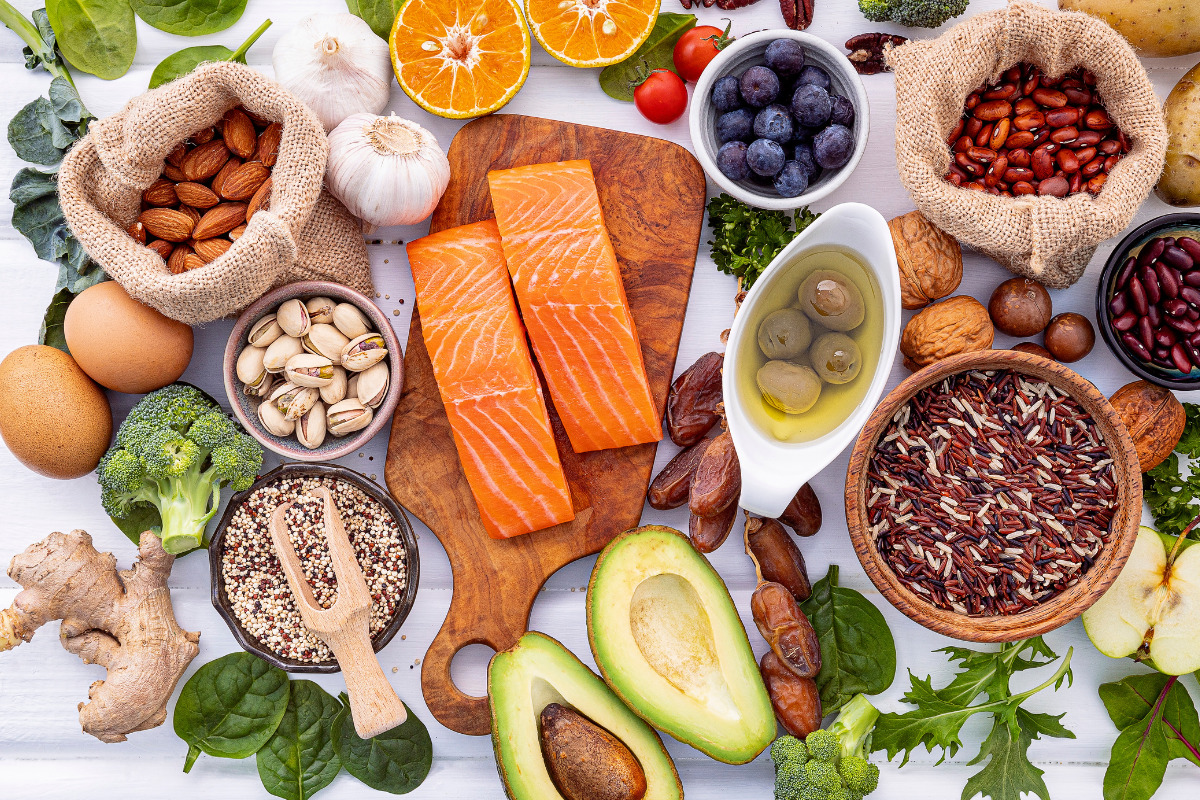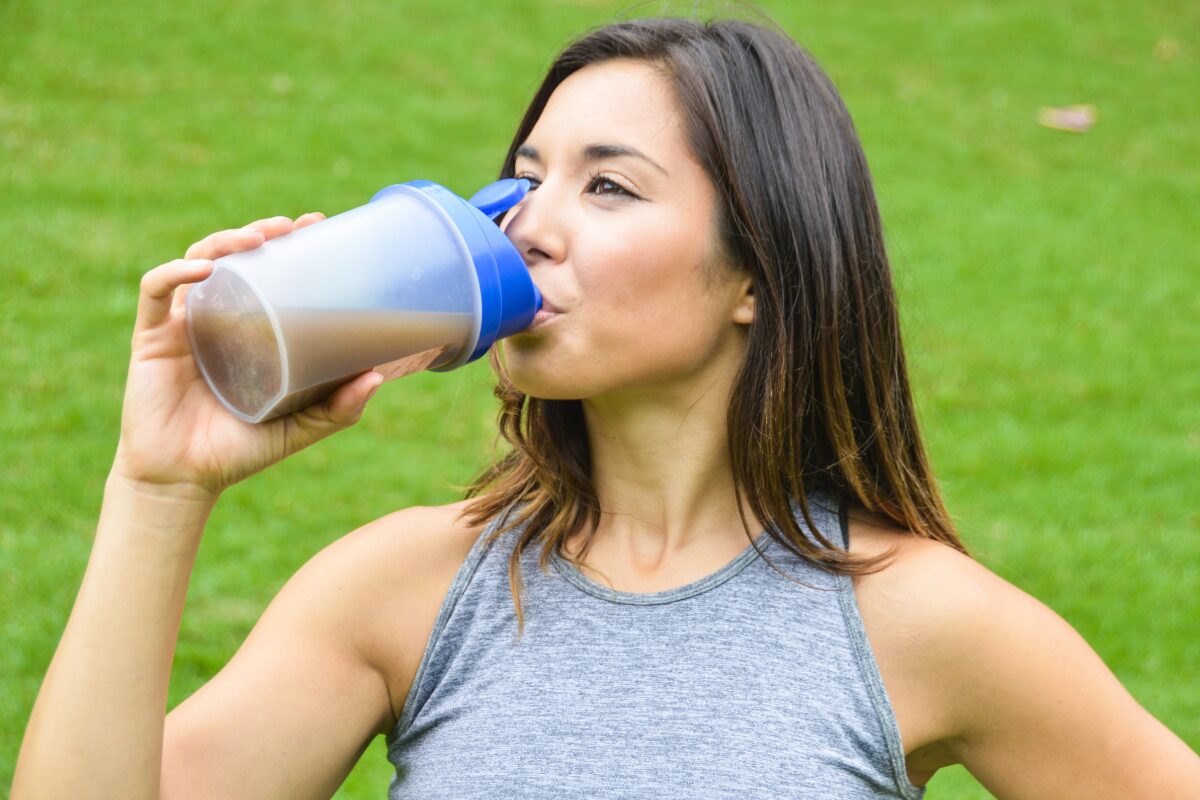The Perimenopause Diet: What to Eat to Feel Better and Healthier

Navigating perimenopause comes with its challenges, but your nutrition can be a powerful tool to support you in your journey. So what should your perimenopause diet include—and avoid? We’ll explore the best eating strategies to minimize symptoms and support your long-term health around the menopause transition.
What is the Best Diet for Perimenopause?
The hormonal fluctuations of perimenopause affect almost all aspects of your life. From brain fog to hair thinning, it can feel like everything is changing. While it can be appealing to focus on supplements or “quick” fixes, experts agree that the most effective approach for fewer symptoms and better health is to focus first on maintaining a consistent foundation of whole foods.
Focus on Whole Foods
Incorporate a variety of fruits, vegetables, whole grains, and lean proteins, using a framework like the Mediterranean diet. Research shows that a plant-forward diet that minimizes red meat and processed foods is the best way to get the nutrients your body needs around menopause. This way of eating also reduces your risk of heart disease, diabetes, dementia and the most common forms of cancer.
Prioritize Protein
Protein becomes even more important as you age. Paired with strength training, it’s a critical ingredient for maintaining a healthy body composition (balance of muscle and fat). Without protein and exercise, adults lose an estimated 3-8% of their muscle mass every year after age 35.
As a rule of thumb, aim for at least 0.5g of protein per pound of bodyweight per day. That means someone who weighs 150lbs should consume at least 75g of protein per day. If you’re active, especially with strength training, the number should be higher—at least 0.7g per pound.
Protein is found in both plant and animal sources, but relying too heavily on animal sources like red meat can contribute to other health risks such as heart disease, calcium loss and increased risk of cancer. Experts recommend prioritizing plant proteins and eating seafood, dairy and poultry in moderation. Some of the richest plant-based protein sources include lentils, beans, peas, tofu, edamame, nuts, seeds and quinoa.
While protein from whole foods at every meal is the best approach, it’s okay to supplement your diet with high-quality protein powders when needed to reach your target.
Healthy Fats
Focus on rich sources of omega-3 fatty acids like fish, flaxseeds, and walnuts. These fats support brain health and reduce inflammation.
Calcium
Bone density declines significantly in the years around menopause. Give your body the building blocks for staying strong by getting sufficient levels of calcium and vitamin D in your diet.
Experts recommend consuming 1000-1200mg of calcium per day. While supplements can help reach this number, it’s best to get calcium from food so the body can better absorb it.
If you do use supplements, choose calcium citrate for best absorption that can be taken with or without food. Calcium carbonate is another good option, but must be taken with food to be available to the body. Calcium is best absorbed in doses of 500mg or less at a time, so you may need to split up your supplements.
Vitamin D
Vitamin D is essential for your body to be able to absorb calcium. Without enough vitamin D, your body is unable to make calcitriol, a hormone necessary for healthy bones.
Women under age 50 should aim for 600 IU of vitamin D per day, and those older than age 50 should aim for 800-1000 IU. There are not many food sources for vitamin D, so many choose to use supplements.
Vitamin D is produced in the body due to sun exposure. Getting out in the daylight is the ideal strategy to meet your daily requirement. About 20 minutes a day of sunlight is all you need to meet your daily Vitamin D requirement.
Stay Hydrated
Experts recommend that women consume 2.7 liters of water per day to keep the urinary and digestive systems moving, skin and hair healthy, and more.
You still need to drink more than 2L of water each day after you subtract the approximately 20% that comes from food. Many people find that drinking more (3L or so) helps them feel their best.
2L ≈ 68oz ≈ 8.5 cups
You need more than 2L of water if:
- You’re exercising and sweating
- You’re in a hot and/or humid environment
- You’re sick (especially if you have vomiting or diarrhea)
- You’re managing a bladder infection or kidney stones
Stick with plain water or water flavored with natural flavors rather than flavored water with added sugar, sports drinks, or carbonated beverages.
Which Foods Should You Avoid During Perimenopause?
Certain foods can exacerbate perimenopausal symptoms. Be mindful of:
Caffeine
While you don’t have to give up your morning cup of coffee or tea, high amounts of caffeine intake can disrupt sleep, exacerbate fatigue and contribute to mood challenges like anxiety and irritability. If you do decide to continue drinking caffeinated beverages, limit the quantity and avoid caffeine after lunchtime.
Alcohol
For many people, alcohol is a big part of being social—and unwinding after a hard day. However, it’s a major source of sugar without added nutritional benefit. While it can help you doze off, it actually decreases the quality of your sleep. Many people find that it actually makes symptoms of depression and anxiety worse, instead of helping them cope.
You may notice major improvements in how you feel after making alcohol an occasional treat instead of a regular part of your diet. At the same time, you’ll be reducing your risk of chronic disease and many types of cancer.
Added Sugar
Added sugars are sugars and syrups added as sweeteners in addition to what is naturally found in whole foods. While high added sugar intake has been linked to cardiovascular and metabolic health risks for all adults, research shows that it’s particularly problematic during menopause.
Higher added sugar intake worsens symptoms like hot flashes and cognitive issues. It can also become an ineffective crutch for dealing with midlife stress, anxiety and poor sleep. A sharp spike and subsequent blood sugar fall will worsen moods and induce more sugar cravings.
Carbohydrates are an important source of your body’s energy. However, getting these sugars from natural foods like dairy, fruits and vegetables gives you the benefit of longer-term energy and more nutrients that accompany your fuel.
Take the time to read the labels on the nutrition labels on foods you eat. Where is added sugar lurking?
Spicy Foods
Some people may find that spicy foods trigger their hot flashes. Monitor your reactions and adjust your diet accordingly.
Look Out for New Dietary Sensitivities
Sensitivities to foods can manifest during perimenopause, even if you haven’t noticed problems before. Many women have identified certain foods like gluten or dairy as triggers for joint pain, headaches, indigestion, hot flashes, and sleep issues. Consider eliminating or reducing these to see if symptoms improve.
How to Incorporate the Perimenopause Diet Into Your Lifestyle
Making dietary changes is a commitment, but it doesn’t have to be overwhelming. Here are some practical tips:
Gradual Transitions
Start by making small, sustainable changes. Swap out processed snacks for fresh fruit or replace sugary beverages with herbal teas. Tackle swaps one by one and find choices that you start to enjoy.
Meal Planning
Plan your meals ahead of time to ensure a well-rounded and nutritious diet. This can also save time and make grocery shopping more efficient.
Pay Attention to How You Feel
The most important reason to change your food choices is because it helps you feel better! Instead of thinking about foods as “good” or “bad,” consider how different choices affect your menopause symptoms, energy, sleep and mood. By connecting choices to results, you’ll find the motivation to keep up the effort.
Embracing a perimenopause-friendly diet can be a powerful step towards managing symptoms and promoting overall health. By being mindful of what you eat, you can support your body through this transitional phase with grace and vitality. Remember, small changes can lead to significant improvements, so approach your perimenopause diet with patience and self-compassion.
Sign up for more unique women’s health content
By submitting this form, you agree to the Lisa Health Privacy Policy and Terms of Use


